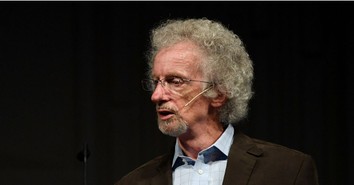3 Encouragements to #MeToo Victims in the Church

In one two-word tweet Alyssa Milano set off a firestorm of victim’s voices throughout Twitter and Facebook. On Sunday night, she issued an invitation for sexual assault victims to make their voice heard:
“Suggested by a friend: ‘If all the women who have been sexually harassed or assaulted wrote “Me Too.” as a status, we might give people a sense of the magnitude of the problem.”
Twenty-four hours later, the response was overwhelming. The magnitude of #MeToo had been retweeted more than a million times on Twitter and over 12 million times on Facebook. Celebrities like Lady Gaga and Debra Messing and women everywhere are tired of remaining silent. On the heels of the Harvey Weinstein sexual assault allegations and the massive cover-up that continues to unfold in the Hollywood industry, victims everywhere want the opportunity to be heard, and they’re hoping it’s finally time.
For the sake of brevity, I won’t attempt to discuss the massively destructive and far-reaching implications of sexual assault on a victim’s life; we know they are complicatedly vast. And as it pertains to the film industry and the wake of Weinstein victims, we’re still waiting on more truth to come to light and justice for the victims. What I want to communicate in this article are truths #MeToo victims can cling to when the sexual assault occurs in our own community or the cover-up happens in the church.
Photo courtesy: ©Thinkstock/Jacob Ammentorp Lund
The church’s #MeToo voices

The church’s #MeToo voices
SLIDE 1 OF 4
Sadly, some of these #MeToo assaults have taken place in churches, by church leadership, or by other church members and, shamefully, have been swept under the rug, dismissed, and forgotten. Mine was.
I was in my early teens when a church leader began to sexually harass me. I was 25 when I was given the words to describe my experience. In retrospect, the young man I’d spent years thinking of as a “crush” had actually been a child predator. His vulgar, sexually explicit words and innuendos and physical advances were sexual assault—even when he called it “flirting” or just “playing around.”
God wants to the church to be passionate about justice and salvation.
At the time and without my knowledge, my parents attempted to report the concerning behaviors they’d personally observed for themselves. (They only knew about a quarter of what was actually going on behind the scenes.) Instead of protecting me, the head pastor chose to protect the offender and his family. He wasn’t even addressed. I left the church and lost touch with many of my childhood friends as a coping strategy. In the few years that followed my departure, he would pursue and victimize even more teenagers from inside the church, under the watch and protection of church leadership.
In Lamentations 5:11, the author weeps and cries out to God over the raping of women in Zion and in the towns of Judah saying, “Why do you forget us forever, why do you forsake us for so many days?” He begs the Lord, “Restore us to yourself, O Lord, that we may be restored!” If you are among the #MeToo victims inside the church and you find yourself lamenting too, here’s what I hope to offer you as you work toward healing:
Three encouragements to #MeToo victims in the church
Photo courtesy: ©Thinkstock/BugTiger
1. God’s wrath is stirred against your assaulter

1. God’s wrath is stirred against your assaulter
SLIDE 2 OF 4
The sexually immoral have no inheritance in the kingdom of Christ and God (Eph. 5:5). The Lord hates the wicked and the one who loves violence (Psa. 11:5). They are an abomination to him (Proverbs 15:9). The wages of their sin is death (Rom. 6:23). The Psalmist assures us, “God is a righteous judge and feels indignation every day. If a man does not repent, God will whet his sword; he has bent and readied his bow” (Psa. 7:11-12). His wrath is revealed from heaven against all ungodliness and righteousness of men, who by their unrighteousness suppress the truth (Rom. 1:18).
God’s wrath is stirred against your assaulter because sexual harassment and sexual assault are sinful and offensive to God.
Photo courtesy: ©Thinkstock/AlexLinch
2. God wants the church to be passionate about justice and salvation

2. God wants the church to be passionate about justice and salvation
SLIDE 3 OF 4
All sexual harassment and assault is sickening and inexcusable. But inside the church, it can be spiritually destructive when the God-given leaders do little to shepherd and protect their flock. In Proverbs 31:9, we are instructed to judge righteously and defend the rights of the poor and needy. The church must do all we can to protect our people from victimization. And sadly, when a church member is victimized through sexual harassment or assault, they become poor and needy, and the church must rise to protect.
In Zechariah 9:3, when God’s people wander like sheep and are afflicted for lack of a shepherd, God says, “My anger is hot against the shepherds, and I will punish the leaders; for the Lord of hosts cares for his flock, the house of Judah.” How much more will he punish leaders who not only fail to lead, but fail to protect? When church leaders care more about protecting their own reputation than defending victims, God’s character is defamed, his bride (the body of Christ) is slandered, and his sheep are ravaged by their own careless shepherds.
Because the Lord cares for his flock, pastors must care for their people through tangible means—certainly through comforting words and compassionate counsel, but also by fulfilling their obligation to turn wolf-like predators over to civil authorities when the offense is unlawful or legally punishable, so justice can be served.
Paul wrote to the Corinthian church instructing them to remove the man guilty of sexual immorality from among the people, to deliver him to Satan for the destruction of the flesh, so that his spirit may be saved in the day of the Lord (1 Cor. 5:4-5). Paul’s command is for the protection of the flock and for the salvation of the offender. Sweeping the offense of the offender under the rug is essentially assigning him to hell. As much as we may flinch at the offer of merciful grace to our offenders, God’s law is laid down for the lawless and disobedient (1 Tim. 1:9) in order that grace may come through Christ Jesus who came into the world to save sinners (v. 14). The same gospel grace that saved us, is available for sexually immoral perpetrators.
Photo courtesy: ©Thinkstock/pecaphoto77
3. God has not forgotten you

3. God has not forgotten you
SLIDE 4 OF 4
Even when crimes go unpunished and churches remain silent, God has not forgotten. God will seek the lost, bind up the injured, and strengthen the weak (Ez. 34:16). The Lord God has sworn by his holiness that behold, the days of justice are coming for those who oppress and crush the defenseless (Amos 4:1-2).
The Lord will take up your cause and ransom and redeem you, too (Lam. 3:58). He will heal your broken heart and bind up your wounds (Psa. 147:3). He will open the prison doors locked shut by your assaulter and proclaim the day of vengeance. He will comfort you and give you beauty instead of ashes, the oil of gladness instead of mourning, and the garment of praise instead of a faint spirit (Isa. 61:1-3). The Lord loves justice and hates robbery and wrong and will faithfully give them their recompense (v.8).
To all the #MeToo folks whose stories come from inside church walls: we have an ear with God. Our voices are heard. And as we wait, “Our eyes are toward you, O God, our Lord; in you we seek refuge; leave us not defenseless” (Psa. 141:8)!
Slideshow based on The Ethics & Religious Liberty Commission article "Encouragement to #MeToo victims inside the church." Used with permission.
Photo courtesy: ©Thinkstock/dueclick
Publication date: October 23, 2017
Originally published October 26, 2017.









